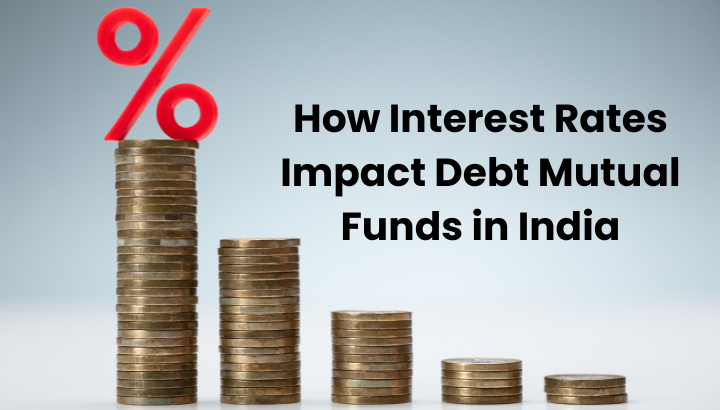How Interest Rates Impact Debt Mutual Funds in India? Regarding mutual funds investment in India, debt mutual funds frequently pull in cautious investors who are looking for stable returns. On the other hand, many investors ignore how deeply interest rates can impact their debt fund performance. If you’re planning to build the best mutual fund portfolio for 2025, then understanding this link becomes really crucial.
The Link Between Interest Rates and Debt Funds
Debt mutual funds mainly invest in fixed-income instruments like government bonds, money market securities, and corporate bonds. Here’s how interest rate changes in India can make a big difference:
-
When interest rates rise: When there is increase in the interest rates, then the market value of existing bonds typically falls. This is because new bonds are released at higher interest rates, which makes the old ones less attractive. Because of this, the Net Asset Value (NAV) of debt funds may fall.
-
When interest rates fall: When there is dip in the interest rates, then the value of existing bonds goes up. Older bonds with higher interest rates become more valuable compared to new bonds which are offering lower returns and this can naturally boost your debt fund’s NAV.
How Interest Rates Impact Debt Mutual Funds in India
Before investing your money in the debt funds, it’s crucial to know why interest rate shifts matter for investors:
-
Impact on Returns: Longer-term holding funds are more delicate to rate changes. On the other hand, short-term holdings are usually less volatile in the market.
-
Reinvestment Risk: When interest rates drop in the market, then the interest gained is invested again at lower returns, which can affect and reduce your future returns.
-
Credit Risk: In a rising interest rate situation, many companies may find it expensive to borrow funds, which can impact the corporate bond funds.
Learn more about how interest rates affect bonds – RBI Source
How to Deal with Interest Rate Risk
Handling interest rate risk smartly is a part of understanding how to choose the right mutual fund in India. Here are some tips to handle them easily:
-
Know your time frame
If your goals are for a short period, then stay with the low-duration or very short duration funds. On the other hand, if your goals are for a long-term, then you may think about considering bond funds that change to rate changes. -
Diversify across durations
Don’t just rely on one type of debt fund only. Spread your investment across different timeframes to balance out the risks and returns in the market. -
Monitor RBI’s stance
Keep a close eye on the Reserve Bank of India’s money-related policies, because it gives you an idea if there will be any movement in the future interest rates. Check RBI’s monetary policy updates -
Consult an advisor
If you are still not sure about the interest rate impact on debt mutual funds, then get advice from a professional fund manager to match funds according to your risk appetite and market situations.
Conclusion
Debt mutual funds can be a smart option to pick if you add it to your mutual fund investment in India plan, but only if you understand how interest rates affect them. By following a balanced mutual fund strategy and choosing the funds smartly, you can easily build the best mutual fund portfolio strategy for 2025 and stay alert if there are any market ups and downs.

